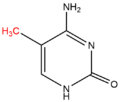Methyltransferase
Methyltransferase is a type of enzyme responsible for the transfer of a methyl group from a donor, typically S-adenosyl methionine (SAM), to an acceptor molecule. Methyltransferases play a crucial role in various biological processes, including DNA methylation, RNA methylation, protein methylation, and the modification of small molecules. These enzymes are involved in the regulation of gene expression, protein function, and the metabolism of drugs and toxins. Their activity is essential for normal development, cellular differentiation, and the maintenance of genomic integrity.
Types of Methyltransferases
Methyltransferases can be broadly classified based on their target molecules:
- DNA Methyltransferases (DNMTs): These enzymes catalyze the transfer of methyl groups to DNA, typically at the 5-position of cytosine rings in the context of CpG dinucleotides, leading to gene silencing. DNMTs are key players in epigenetics, affecting gene expression without altering the DNA sequence.
- RNA Methyltransferases: These enzymes modify RNA molecules, including messenger RNA (mRNA), transfer RNA (tRNA), and ribosomal RNA (rRNA), which can affect their stability, translation efficiency, and the accuracy of protein synthesis.
- Protein Methyltransferases: These enzymes methylate amino acids in protein substrates, influencing protein-protein interactions, protein stability, and the activation or inactivation of enzyme functions.
- Small Molecule Methyltransferases: These enzymes are involved in the methylation of small molecules, such as hormones, neurotransmitters, and drugs, affecting their metabolism, activity, and the body's response to them.
Function and Mechanism
The primary function of methyltransferases is to transfer a methyl group (-CH3) from the methyl donor, S-adenosyl methionine (SAM), to specific target molecules. This methylation reaction involves the formation of a covalent bond between the methyl group and the acceptor atom, which can be oxygen, nitrogen, or carbon, depending on the type of methyltransferase and the substrate.
Methylation can have diverse effects on the target molecules:
- In DNA, methylation typically leads to the repression of gene expression.
- In RNA, methylation can affect the molecule's stability, structure, and function.
- In proteins, methylation can alter the protein's activity, localization, and interactions with other molecules.
- In small molecules, methylation can modify their pharmacological properties and biological activity.
Clinical Significance
Abnormal methyltransferase activity is associated with various diseases, including cancer, neurodegenerative diseases, and cardiovascular diseases. For example, hypermethylation of tumor suppressor genes by DNMTs can lead to gene silencing and cancer progression. Conversely, hypomethylation can activate oncogenes. In neurodegenerative diseases, such as Alzheimer's disease, abnormal protein methylation has been implicated in the pathogenesis.
Research and Therapeutics
Given their crucial role in many biological processes and disease states, methyltransferases are important targets for drug discovery and therapeutic intervention. Inhibitors of DNMTs, for example, are being explored for the treatment of cancer and other diseases characterized by aberrant methylation patterns.
See Also
References
Transform your life with W8MD's budget GLP-1 injections from $125.
W8MD offers a medical weight loss program to lose weight in Philadelphia. Our physician-supervised medical weight loss provides:
- Most insurances accepted or discounted self-pay rates. We will obtain insurance prior authorizations if needed.
- Generic GLP1 weight loss injections from $125 for the starting dose.
- Also offer prescription weight loss medications including Phentermine, Qsymia, Diethylpropion, Contrave etc.
NYC weight loss doctor appointments
Start your NYC weight loss journey today at our NYC medical weight loss and Philadelphia medical weight loss clinics.
- Call 718-946-5500 to lose weight in NYC or for medical weight loss in Philadelphia 215-676-2334.
- Tags:NYC medical weight loss, Philadelphia lose weight Zepbound NYC, Budget GLP1 weight loss injections, Wegovy Philadelphia, Wegovy NYC, Philadelphia medical weight loss, Brookly weight loss and Wegovy NYC
|
WikiMD's Wellness Encyclopedia |
| Let Food Be Thy Medicine Medicine Thy Food - Hippocrates |
Medical Disclaimer: WikiMD is not a substitute for professional medical advice. The information on WikiMD is provided as an information resource only, may be incorrect, outdated or misleading, and is not to be used or relied on for any diagnostic or treatment purposes. Please consult your health care provider before making any healthcare decisions or for guidance about a specific medical condition. WikiMD expressly disclaims responsibility, and shall have no liability, for any damages, loss, injury, or liability whatsoever suffered as a result of your reliance on the information contained in this site. By visiting this site you agree to the foregoing terms and conditions, which may from time to time be changed or supplemented by WikiMD. If you do not agree to the foregoing terms and conditions, you should not enter or use this site. See full disclaimer.
Credits:Most images are courtesy of Wikimedia commons, and templates, categories Wikipedia, licensed under CC BY SA or similar.
Contributors: Prab R. Tumpati, MD






